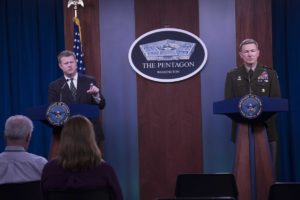Army leadership said Thursday 2,000 reservists across 14 medical task forces are assisting in the pandemic response at temporary hospital facilities in six states, and the service is progressing on vaccine development with human testing to potentially begin this summer.
Secretary Ryan McCarthy and Gen. James McConville, the Army chief of staff, provided the update to reporters as the service nears 1,000 positive COVID-19 cases across the full Army, Reserve and National Guard.

“The Army is fighting the virus on multiple fronts, from medical support efforts in our cities to searching for a vaccine in order to stay ready so we can continue to be the Army the nation deserves,” McCarthy said.
McCarthy noted the Army has 25,000 National Guardsmen assisting in the pandemic response effort in all 50 states and 2,000 Army reservists from its Urban Augmentation Medical Task Forces deployed in New York, New Jersey, Michigan, Massachusetts, Pennsylvania and Connecticut.
McConville also confirmed the two Army field hospitals in Seattle have completed their mission and are awaiting a request from FEMA before deploying to the next city to set up temporary hospital beds and provide medical assistance and equipment.
“What every state is doing is they’re preparing for the worst. They were prepared for the situation where they wouldn’t have the capacity in their hospitals, so we built that capacity in record time. It was up in four or five days and ready to go. But when they realized they had flattened the curve in Washington state, they decided they no longer needed that capability,” McConville said.
The Army’s vaccine research effort is currently focused on testing three vaccine prototypes on small animals, with plans to potentially downselect this summer to one vaccine for initial clinical testing on humans.
McCarthy also said he is traveling on Friday to visit the Army’s Joint Manufacturing Technology Center at Rock Island Arsenal, where the service is currently 3D printing parts for ventilators and face shields that will be offered to FEMA.
The Army has also asked industry partners to assist in the pandemic response effort by producing parts for critical medical supplies, according to McCarthy.
“We have asked industry partners for help and they have responded. They’re retooling production lines to manufacture masks, gowns, ventilators and other critical personal protective equipment,” McCarthy said.
Last Friday, the Army also announced it’s using the xTech Search emerging technologies program to find vendors with innovative solutions for low-cost, low-maintenance ventilators that can be rapidly produced. (Defense Daily, April 10).